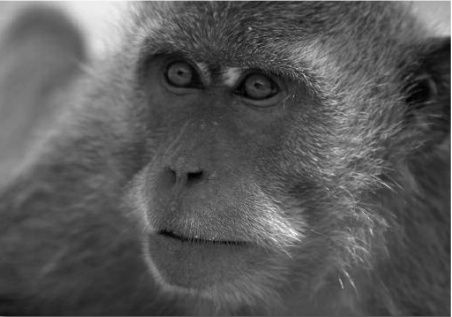WHY CARE ABOUT ANIMALS?
In the past, most people believed that non-human animals didn’t have feelings or intelligence. It was thought that animals weren’t important and that they existed simply for people to use for food, clothing, transport, labour and entertainment. However, as human society has advanced, we have come to realise that animals do matter. We now know that animals are capable of feeling physical pain just like we are. We also know that they experience emotions such as fear, sadness, loneliness and depression.
WHAT RIGHTS DO ANIMALS NEED?
No-one suggests that animals should have the same rights as people. The right to vote, or to freedom of speech for example, would make no sense to a dog.
But the right not to be tortured or hurt unnecessarily is as important to an animal as it is to a person. And the right not to be imprisoned is important, too. We know, for example, that social animals, such as monkeys and mice, suffer emotional distress when they are kept on their own in captivity.
WHICH ANIMALS HAVE RIGHTS?
Many animals are described as being sentient, because, as already noted, they have feelings and emotions and can experience physical pain. It’s not just mammals and birds who are sentient. We know that many other animals, including fish, lobsters and octopuses can also feel pain. Even when we cannot be certain that animals experience pain, for example in the case of worms or insects, some people believe that we should give them the benefit of the doubt and avoid harming them.
ANIMAL RIGHTS VERSUS ANIMAL WELFARE
Animal rights supporters think that it is morally wrong to exploit animals for any reason. Animal welfare supporters believe that it is OK to use animals, as long as they are looked after and their suffering is kept to a minimum.
The difference between the two philosophies has been summed up like this: Animal rights people are campaigning for no cages, while animal welfare people are campaigning for bigger cages.
SOME ARGUMENTS AGAINST ANIMAL RIGHTS
Animals don’t understand…
Some people argue that animals can’t have rights because they don’t understand or know what it means to have rights. However, defenders of animal rights point out that young babies and people with severe mental disabilities also don’t understand the idea, yet this does not prevent us from giving them rights. Furthermore, animals such as chimpanzees are more aware of what’s going on around them than are human babies.
Animals are not intelligent…
Other people say that animals cannot be granted rights because they are not as intelligent as human beings. But if you think about it, your rights don’t depend on how intelligent you are – if you achieved an A in your exam, it wouldn’t mean that you have any more basic rights than someone who got a Fail.
Animals hurt one another…
It is sometimes argued that animals are cruel to each other, so people should not feel bad about abusing animals. It is true that some animals kill other animals in order to eat them. The difference is that these animals are not knowingly cruel – they are simply behaving naturally and are not aware of the suffering that they cause. A lion doesn’t know that he is hurting a gazelle, but he does know that he has to kill to survive. Humans on the other hand are aware that other animals can suffer and they can decide to change their actions accordingly.
RELIGIOUS VIEWS
BUDDHISM AND JAINISM
A central principle of Jainism and Buddhism is ahimsa, which means non-violence and harmlessness (not to harm any living creature).
The doctrine of karma, which is important to Jains, Buddhists and Hindus, teaches that any wrong behaviour will have to be paid for in a future life, so cruel acts to animals should be avoided. Similarly, good behaviour, such as kindness to animals, will be rewarded.
Buddhists believe that it is wrong to hurt or kill animals, because all beings are afraid of injury and death. Jains believe that animals, like humans, have souls and that each of these souls is considered of equal value and should be treated with respect and compassion. Today, about half of all followers of Buddhism are vegetarian. Jains on the other hand are strict vegetarians and are also not allowed to do jobs that cause harm to animals.
CHRISTIANITY
The Biblical story of creation decreed that humans were created in the image of God and given dominion over the rest of creation. The term dominion was taken by early Christians to mean that human beings should have power over non-human animals. It was also generally considered that animals didn’t have souls.
Today, Christian teaching tends to be kinder to animals. Most Christians now agree that human dominion over nature means stewardship rather than domination and exploitation. Dr Andrew Linzey (a leading modern Christian writer on animal rights) has said: ‘Human beings should care for animals, because they are part of God’s creation.’
HINDUISM
Ahimsa, an important belief in Hinduism, teaches kindness and non-violence towards all living things including animals.
Devout Hindus believe in reincarnation, which means rebirth into a higher or lower existence, determined by how we live our lives; this is the law of karma. Hindus believe that animals, like humans, have souls.
Being vegetarian is highly respected, because of the principle of non-violence (ahimsa) and the doctrine of karma (harming animals is bad karma).
The cow is greatly revered by Hindus and is regarded as sacred. Killing cows is banned in India, and Hindus do not eat beef products.
ISLAM
The Qur’an says that animals were created for people to use: It is God who provided for you all manner of livestock, that you may ride on some of them and from some you may derive your food. And other uses in them for you to satisfy your heart’s desires. Qur’an 40:79-80
However, Muslims are instructed to avoid treating animals cruelly. Mohammed is quoted as saying: ‘You will be rewarded by Allah for your acts of kindness towards living creatures.’
Muslims are allowed to eat only halal meat that has been killed according to Sharia law (see section on religious slaughter).
JUDAISM
Judaism teaches that animals should be treated with compassion because they are part of God’s creation, and that human beings must avoid causing pain to any living creature.
Genesis states that God has given human beings dominion over all living things. Dominion is usually interpreted as stewardship – living things are to serve humanity, but human beings, as part of their dominion, are required to look after all living creatures. Hunting for sport is forbidden.
Observant Jews should eat only meat or poultry that has been killed in the approved way, called shechita (see below).
RELIGIOUS SLAUGHTER
Religious slaughter involves cutting the animal’s throat while he/she is conscious. UK law normally requires animals to be stunned first so that they are unconscious when they are killed.
Many Jews and Muslims say that religious slaughter is humane and that the animals killed in this way do not suffer if the cut is made quickly and cleanly. However, many other people argue that the animals do suffer because they remain conscious long enough to feel pain. Several European countries, including Sweden and Norway, have banned religious slaughter methods because they believe that they are cruel. Of course, Animal Aid undercover films have found that animals killed by non-religious methods are often conscious when killed, due to the poor running of slaughterhouses.









